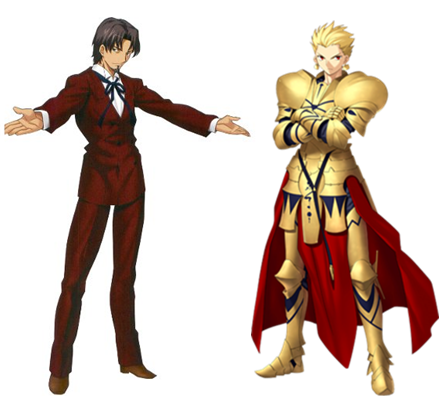Fate/Zero: Masters and Servants (Part 2)
| By Saberpilot on Aug. 25, 2014 | |
Fate/Zero:
Light Novels: Gen Urobuchi with illustrations by Takashi Takeuchi, 2006-2007. Translations written by Baka-Tsuki
(http://baka-tsuki.org/project/index.php?title=Fate/Zero).
Anime. Aniplex, 2013.

Master/Servant Tokiomi Tohsaka and Archer (Gilgamesh)
It almost seems a shame that these two were partnered, and as a result, nearly predestined that the partnership would end in failure. If we analyze this through the lens of gender, it seems incredibly obvious. Tohsaka is, despite his lineage of a masculine-dominated field of magicians, exceptionally progressive in that he not only wishes for the magical growth and fulfillment of both his daughters (though it is unknown to him the practices the Matou family use in order to reach their pinnacle growth and what Sakura is subjected to), but plans for his daughter Rin to become the head of the Tohsaka clan. He wants the best for both of his daughters- not as women, but as magicians. This is a key point if for no other reason than while he seems to disregard his wife Aoi as nothing more than a vessel for their children – a fact corrected insofar as the genuine affection shown between Aoi after the events of Fate/Zero, even without cognitive capabilities she demonstrates her affection to the imagined Tokiomi (Episode 25) – the truth is that he values his children for their magical value, rather than their sex.
He encourages Rin in her magical growth, teaching her where her boundaries are, as well as demonstrating where she can learn (Episode 10). He rewards her incessant curiosity for more knowledge with a pendulum attracted to mana – with which she uses to single-handedly sort out and save children being kidnapped by Ryūnosuke and Caster (10). Her actions are the result of a parent who has been doing their best to have their child self-actualize as a person – and treats her as such, rather than just a ‘girl’ or ‘boy.’ Granted, at the age of 8, most parents would be incredibly horrified to find that their daughter having rushed out to another precinct to do such a thing – but in the visitation to his family (Novel #3), Tokiomi knows nothing but faith in his daughter to succeed him.
The fact that he is then partnered with Gilgamesh, then, is not only a conflict of beliefs, but also philosophies. In the ancient text of Gilgamesh, the perfect being is created by the Gods to be a man – a man who, after creating the city of Uruk and defying his creators, left “no son alive and no virgin to her lover” (Epic of Gilgamesh). The only way in which he was to be defeated was by another man – who Gilgamesh attempted to undermine by sending a prostitute to him. Gilgamesh views others as toys to be played with, women even lower than that. The fact that he asks Saber to marry him is to him an honest compliment, even when everyone around realizes that he intends to hold her as a form of subjugation for his pleasure. Indeed, he is most pleased whenever Saber is angry or upset, hurt, or tortured. His being matched with Tohsaka becomes problematic – not only does he fail to have his ego stroked by Tohsaka, who expects him to behave as a proper Servant, but he is unwilling to submit to Tohsaka, a person who sees others not as tools but equals. To do so would mean that he is less than God among men.
It is also why he is incredibly willing to turn turncoat on Tohsaka and make a contract with the (at that time) Servant-less Kirei Kotomine, who once was the Master to Assassin.

Master/Servant Kirei Kotomine and Assassin (Hasan Sabbāha)
It is incredibly obvious for the same reasons that Kotomine and Assassin are also incompatible. While the original name of Hasan Sabbāha may have belonged to the head of the Order of Assassins (and every Assassin Servant to be summoned has been of the Order), the particular one who is summoned to Kotomine suffers from multiple personality disorder. Because of this, the identities/bodies that Sabbāha demonstrate are both male and female, as his personalities and bodies are from a range of constructs within his mind. The Order did not distinguish between male and female, therefore there was absolute equality based on performance and not physical sex.
However, Kotomine is unfortunately a very misogynist character – the wife he had loved prior to the series dying may have set the process in motion, though it is regarded that she was a very subservient and reclusive young woman (Light Novel 1). He also has an upbringing through the church, further encouraging him to see women as secondary beings, unclean (Light Novel 2). His regard to Rin and Tohsaka’s wife is that of fleeting creatures that are not to the same class that he is; he disregards Tohsaka as weak for his utter devotion to them. Instead, he plays games with them, as seen with his interactions with Rin both prior to and after the Grail War (Episode 1 & 25). Under Gilgamesh’s influence, he becomes incredibly drawn to playing with and toying with human lives, much as the King of Kings – he disregards both Irisviel and Maiya as threats when they attack him to prevent him from hurting Kiritsugu (8), not just because he regards Kiritsugu as a “lone wolf” but also because he simply sees women as no threat.
Though their time as Master and Servant was cut short, undermining a possible conflict coming to rise, it seems inevitable that Kotomine would have disregarded any of Assassin’s forms that were female. It is interesting to note that during the anime, the Assassin forms that speak with him are always male – females seem to stay in the background and are secondary to their male counterparts.